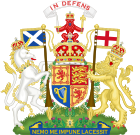Human Tissue (Authorisation) (Scotland) Act 2019
| Act of the Scottish Parliament | |
 | |
| Long title | An Act of the Scottish Parliament to make provision about authorisation of the removal and use of part of the body of a deceased person for transplantation and other purposes; and for connected purposes. |
|---|---|
| Citation | 2019 asp 11 |
| Introduced by | Shona Robison MSP, Cabinet Secretary for Health and Sport |
| Territorial extent | Scotland |
| Dates | |
| Royal assent | 18 July 2019 |
| Other legislation | |
| Amends | Human Tissue (Scotland) Act 2006 |
Status: Current legislation | |
| History of passage through Parliament | |
| Text of statute as originally enacted | |
The Human Tissue (Authorisation) (Scotland) Act 2019 (asp 11) is an act of the Scottish Parliament. The Act changed the law regarding organ donation so that unless someone expressly opted out, they would be deemed as having given consent.
History
[edit]In June 2017, the Scottish Government announced its intentions to bring forward legislation for an opt-out system for organ donation.[1] In 2018, the Scottish Government announced published the bill.[2] In February 2019, the Scottish Parliament debated presumed consent for organ donation.[3]
In 2021, the Act was commenced - this had been delayed due to the Coronavirus pandemic.[4][5]
Provisions
[edit]The Act has several exceptions for eligibility that mirror the Organ Donation (Deemed Consent) Act 2019.[6]
the Scottish model places less weight on the role of those in qualifying relationships and more on the principle of deemed consent than the Organ Donation (Deemed Consent) Act.[6]
Reception
[edit]The lack of public awareness around the register for registering objections to opt-out of organ donation makes the safeguards less effective.[6] Unlike England, there is no app-based system for registering medical an objection.[6]
The Act has been criticised for potentially reducing the rate of donation by giving to much weight to qualifying relationships.[7]
Examples
[edit]During September 2021, a young father revealed he was able to be present for the birth of his child, because of a heart had been donated on the basis of deemed authorisation.[8]
See also
[edit]References
[edit]- ^ "Opt-out organ donation system in Scotland planned". BBC News. British Broadcasting Corporation. 18 June 2017. Retrieved 10 October 2024.
- ^ "Plan for Scottish opt-out organ donation system published". BBC News. British Broadcasting Corporation. 11 June 2018. Retrieved 10 October 2024.
- ^ "MSPs to debate presumed consent for organ donation". STV News Archive. STV plc. 26 February 2019. Retrieved 10 October 2024.
- ^ Macaulay, Joanne (25 March 2021). "Scots become automatic organ donors under new law". BBC News. British Broadcasting Corporation. Retrieved 10 October 2024.
- ^ Parsons, Jordan A.; Moorlock, Greg (28 August 2020). "A global pandemic is not a good time to introduce 'opt-out' for organ donation". Medical Law International. 20 (2): 155–166. doi:10.1177/0968533220950002. ISSN 0968-5332.
- ^ a b c d Parsons, Jordan A (10 April 2021). "Deemed consent for organ donation: a comparison of the English and Scottish approaches". Journal of Law and the Biosciences. 8 (1): lsab003. doi:10.1093/jlb/lsab003. ISSN 2053-9711. PMC 7989506. PMID 33981445.
- ^ McLaughlin, Leah (8 October 2024). "Opt-out laws designed to make organ donation easier may have actually made it harder, says research". The Conversation. The Conversation Trust (UK) Limited. Retrieved 8 October 2024.
- ^ "Father with serious heart condition witnesses birth of first child thanks to transplant". Sky News. Sky plc. 20 September 2021.
